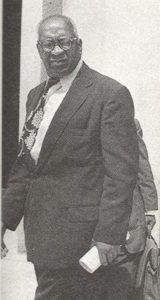
William L. Patterson
*William Lorenzo Patterson was born on this date in 1891. He was a Black activist.
Born in San Francisco, California, his father, James Edward Patterson, was from St. Vincent in the British Virgin Islands. His mother, Mary Galt Patterson, was born a slave in Virginia. She was the daughter of the organizer of a volunteer regiment of black soldiers who fought with the Union Army during the American Civil War. Patterson's father was a Seventh-day Adventist missionary to Tahiti, and he spent extensive time there, with the rest of the family moving between Oakland and Mill Valley, California, where William attended public schools.
In 1911, Patterson was the first Black graduate of Tamalpais High School in Mill Valley, California. In the yearbook, his ambition was "to be a second Booker T. Washington." After graduation, Patterson worked as a laborer in railroad dining cars and on boats on the Pacific coast. He saved up enough money to enter the University of California, Berkeley. He was expelled during World War I because he refused to participate in compulsory military training. Wanting to become a lawyer, Patterson entered the Hastings College of Law, from which he graduated in 1919 but failed the California State Bar Examination.
He then decided to pursue emigration to Liberia, working as a cook on a mail ship to England as a means to this end. Patterson found his inquiries about Liberian emigration put off in England due to his lack of construction or practical craft skills. Determined to return to the United States, he landed in New York and gained employment as a longshoreman. Patterson found employment as a clerk in a law office and studied to take the New York State Bar Examination, which he passed in 1924. During this time, he married his first wife, Minnie Summer, and made numerous personal acquaintances associated with the booming Harlem Renaissance.
Among Patterson's New York friends was political activist Richard B. Moore. Patterson joined the Workers (Communist) Party and became head of the International Labor Defense, a communist legal advocacy organization. On August 22, 1927, he was arrested for protesting the execution of immigrants Nicola Sacco and Bartolomeo Vanzetti, who were anarchists. Patterson was active in the Civil Rights Congress, which succeeded the ILD. This group offered legal representation to communists, trade unionists, and African Americans in political or racial persecution cases.
In 1951 he presented the document, We Charge Genocide, to the United Nations, charging the U.S. federal government with complicity in genocide for failing to pass legislation or prosecute persons responsible for lynching in the United States, of which most victims were black men. His second marriage was to Louise Thompson in 1940. A writer, she had a long association with the poet Langston Hughes, and they collaborated on a proposal for a documentary about Harlem culture. In the 1960s, Patterson defended Angela Davis and the leaders of the Black Panther Party. William L. Patterson died on March 5, 1980, at Union Hospital in the Bronx following a prolonged illness. He was 88 years old at the time of his death; his papers are housed at Howard University.